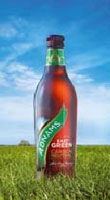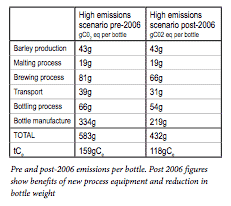Beer with less carbon
What trigger is the company responding to?
With volumes increasing and the footprint of the organisation struggling to fit within the confines of its Southwold base, important decisions regarding the production and distribution of their products needed to be made. Ageing production equipment needed to be replaced and a new out-of-town distribution centre was required - it was important that these decisions reflected the values of the company.
What was the response?
The distribution centre was built largely with low carbon materials with excellent insulating properties (e.g. lime and hemp, glulam beams, turfed roof, minimal steel) and also incorporated solar heating and rainwater recovery systems. These measures, plus building location and ventilation design helped to avoid the need for cooling systems to preserve the product. The new production equipment was chosen with quality and efficiency as key priorities - for example 100% of the process steam is reused which means that 90% of the heat from one brew is used to make the next brew.

Bottom line benefits
The new production equipment reduced gas bills by 31% (despite rising volumes) and uses over 60% less water per pint produced. Although the distribution centre cost 15% more than a standard building, electricity bills have been reduced by £49,000 pa compared to an equivalent 'standard' unit and uses 58% less gas and 67% less electricity per square metre than the old centre. The company also worked with their supplier to reduce bottle weight by a third, and has historically used high yield local crops to reduce pesticide use and transport of raw materials. As a result of these wide ranging efforts, Adnams were able to participate in a Tesco promotion involving low carbon products. In conjunction with the University of East Anglia CRed carbon reduction scheme and the Carbon Trust, they leveraged their efficient operation to produce a beer which emitted 25% less carbon than previously (see figure). With a small amount of offsetting (0.004p per bottle), the East Green beer was certified as carbon neutral to the distribution centre.

Wider lessons
Adnams' efforts have not been concentrated on one particular area but across every aspect of the production and distribution of products and have included working with others where the company did not possess the expertise or ability to make changes. Adnams' values mean that even when an investment was revenue neutral or slightly negative, they were prepared to back it because they believed it had benefits. These may not show up on the balance sheet, but contribute to the long term sustainability of the organisation.
Case study sources
Based on site visit to Adnams production and distribution facility, 23rd December 2008 by David Morgan (University of Cambridge)
CRed Case Study, East of England Development Agency.
http://www.eeda.org.uk/files/case-studies/CRED_v1.5_April_2008_FINAL.pdf April 2008
http://www.cred-uk.org/
http://adnams.co.uk/









